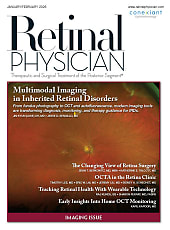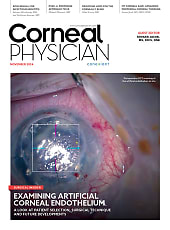I am honored to welcome you to another edition of New Retinal Physician. As always, this publication features exciting cases and concepts that stem from our daily discussions within the Young Retina Forum (YRF). We aspire to not only provide educational content, but also to remind each other that we are not alone in the challenge of retina practice.
Earlier this year, one of our young retina colleagues died unexpectedly. After the initial sadness and shock of this tragedy, I spent some time thinking about what we could learn from this unfortunate event. In a poll of YRF members, we found that 93% of retina specialists consider themselves “stressed,” but only 10% of them reported interest in speaking with a mental health professional about these feelings.
A mentor once told me, “Being hungry, angry, lonely, tired, sick, or in pain leaves you vulnerable.” We may all have different definitions of vulnerability, but this mantra has encouraged me to focus on physical and mental wellness. I hope it provides you with some guidance in your daily practice, both personal and professional.
In this month’s issue, uveitis specialist Dr. Jessica Weinstein presents a unique case of atypical ocular toxoplasmosis (p. 9), providing insight on how to manage the initial presentation of multifocal necrotizing retinitis. Specifically, Dr. Weinstein recommends obtaining ocular fluid for polymerase chain reaction (PCR) testing and initiating empiric treatment for toxoplasmosis and herpetic causes in all newly diagnosed necrotizing retinitis cases. Ocular oncologists Dr. Musa Abdelaziz and Dr. Armin Afshar present an overview of primary vitreoretinal lymphoma (PVRL), which is often misdiagnosed as uveitis and treated with long-term steroids. Within their article (p. 12), Drs. Abdelaziz and Afshar describe their technique for obtaining an undiluted vitreous sample for cytologic analysis. It is worth noting that whenever PVRL is correctly diagnosed before central nervous system (CNS) involvement, the survival timeline increases from 35 months to 60 months—another example of how we can assist our patients, and their families, in times of difficulty and personal challenges.
In alignment with our goal of supporting the next generation of retina specialists, Dr. Sid Schechet and his medical student, Eric Lai, present a case of gyrate atrophy of the retina and choroid (p. 15). Most importantly, they emphasize that early diagnosis can lead to dietary intervention and recommend screening of family members. Finally, circling back to the theme of self-care, Dr. Nora Khatib discusses the importance of work-life balance in this edition’s Practice Management Strategies column (p. 18).
As the American novelist Anne Lamott once wrote, “Almost everything will work again if you unplug it for a few minutes…including you.” I invite you to join us for ARF 2022 in Puerto Rico from June 29 to July 3, 2022. To register, please visit www.retinaforum.org/national-meeting. Remember, no suits, no podiums, and no egos! NRP
— Hemang K. Pandya, MD, FACS
President, American Retina Forum
Co-Chief Medical Editor, New Retinal Physician









